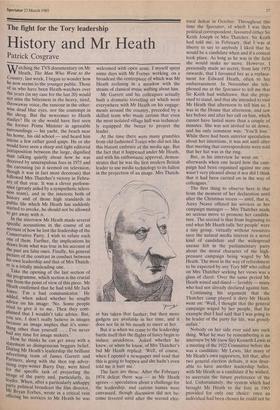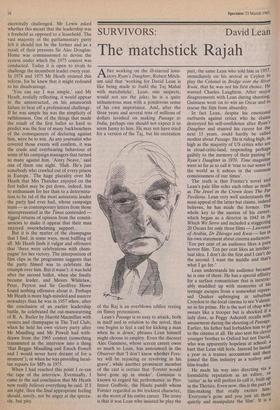The fight for the Tory leadership
History and Mr Heath
Patrick Cosgrave
Watching the TVS documentary on Mr Heath, The Man Who Went to the Country, last week, I began to wonder how he now seems to the younger public. Those of us who have been Heath-watchers over the years (in my case for. the last 20) would not miss the bitterness in the heavy, tired, throwaway voice, the rancour in the other- wise dead blue eyes, nor the contempt in the shrug. But the newcomer to Heath studies? He or she would have first seen the former Prime Minister in agreeable surroundings — his yacht, the beach near his home, his old school — and heard him Intone a few rather good quips. He or she would have seen a sharp and tight editorial juxtaposition between the large, dignified man talking quietly about how he was deceived by unscrupulous foes in 1975 and the carousing (so it seemed on television, though it was in fact most decorous) that followed Mrs Thatcher's victory in Febru- ary of that year. It was a clever perform- ance (greatly aided by a sympathetic televi- sion team), and in the interests both of history and of those high standards in public life which Mr Heath has suddenly started to invoke, he should not be allowed to get away with it.
In the interview Mr Heath made several specific accusations in the course of an account of how he lost the leadership of the Conservative Party. I wish to refute each one of them. Further, the implications he draws from what was true in his account of the past are false ones. Finally, his general picture of the contrast in conduct between
his is leadership and that of Mrs Thatch- er s a totally misleading one. Take the opening of the last section of the programme, which section is the crucial one from the point of view of this piece. Mr Heath confirmed that he had told Mr Jack Jones: 'I'm a bad communicator.' He added, when asked whether he sought advice on his image: `No. Some people tried to give it to me. Then they com- plained that I wouldn't take advice. But, You see, I don't really believe in images because an image implies that it's some- thing other than yourself . . . I've never had any time for image makers.' How he thinks he can get away with a statement so disingenuous beggars belief. During Mr Heath's leadership the brilliant
advertising team of James Garrett and Partners, along with the then top adver- tising copy-writer Barry Day, were hired for the specific task of projecting the Image of the party and, particularly, its leader. When, after a particularly unhappy
Party political broadcast the film director, Mr Bryan Forbes, wrote in a critical vein offering his services to Mr Heath he was
welcomed with open arms. I myself spent some days with Mr Forbes working on a broadcast the centrepiece of which was Mr Heath reclining in a meadow with the strains of classical music wafting about him.
Mr Garrett and his colleagues actually built a dramatic travelling set which went everywhere with Mr Heath on his engage- ments around the country, preceded by a skilled team who made certain that even the most isolated village hall was technical- ly equipped the better to project the leader.
At the time there were many grumbles from old-fashioned Tories who did not like this blatant embrace of the media age. But the fact that it happened under Mr Heath, and with his enthusiastic approval, demon- strates that he was the first modern British leader to use media technology to its fullest in the projection of an image. Mrs Thatch-
er has taken that further; but then more gadgets are available in her time, and it does not lie in his mouth to sneer at her.
But it is when we come to the leadership battle itself that the flights of fancy begin to induce airsickness. Asked whether he knew, or when he knew, of Mrs Thatcher's bid Mr Heath replied: `Well, of course, when 1 opened a newspaper and read that this is going to happen and she hadn't even told me it hurt me.'
The facts are these. After the February 1974 defeat there was — as Mr Heath agrees — speculation about a challenge for the leadership, and various names were canvassed, though discussion did not be- come fevered until after the second elec- toral defeat in October. Throughout this time the Spectator, of which I was then political correspondent, favoured either Sir Keith Joseph or Mrs Thatcher. Sir Keith had told me, in February, that I was at liberty to say to anybody I liked that he would be a candidate when and if a contest took place. As long as he was in the field she would make no move. However, I personally made no secret, from late 1973 onwards, that I favoured her as a replace- ment for Edward Heath, often to her embarrassment. In November she tele- phoned me at the Spectator to tell me that Sir Keith had withdrawn, that she prop- osed to stand, and that she intended to visit Mr Heath that afternoon to tell him so. I was in the House that afternoon, and saw her before and after her call on him, which cannot have lasted more than a couple of minutes. She was not invited to sit down,
and his only comment was: `You'll lose.' While there had been anterior speculation about her intentions, it was not until after that meeting that correspondents were told that her hat was in the ring.
But, in his interview he went on: . .
afterwards when one heard how the cam- paign had been organised against me one wasn't very pleased about it nor did I think that it had been carried on in the way of colleagues.'
The first thing to observe here is that from the moment of her declaration until after the Christmas recess — until, that is, Airey Neave offered his services as her campaign manager — Mrs Thatcher made no serious move to promote her candida- ture. The second is that from beginning to end what Mr Heath calls 'her people' were a tiny group, virtually without resources save the natural media interest in a novel kind of candidate and the widespread unease felt in the parliamentary party about the moral character of the high- pressure campaign being waged by Mr
Heath. The most in the way of refreshment to be expected by any Tory MP who called on Mrs Thatcher seeking her views was a
glass of claret. Over the same period Mr Heath wined and dined — lavishly — many who had not already declared against him. Continuing his argument that the Thatcher camp played it dirty Mr Heath went on: 'Well, I thought that the general campaign waged by her people, that for example that I had said that I was going to be leader of the party for life, was grossly unfair.'
Nobody on her side ever said any such thing. What he may be remembering is an
interview by Mr (now Sir) Kenneth Lewis at a meeting of the 1922 Committee before she was a candidate. Mr Lewis, like many of Mr Heath's own supporters, felt that, after two general election defeats, it was desir- able to. have another leadership ballot, with Mr Heath as a candidate if he wished, to ascertain the future preference of the led. Unfortunately, the system which had brought Mr Heath to the fore in 1965 provided for only one choice: once an individual had been chosen he could not be electorally challenged. Mr Lewis asked whether this meant that the leadership was a freehold as opposed to a leasehold. The vast majority of the parliamentary party felt it should not be the former and as a result of their pressure Sir Alec Douglas- Home was commissioned to devise the system under which the 1975 contest was conducted. Today it is open to rivals to challenge the incumbent leader every year. In 1974 and 1975 Mr Heath resisted this reform, for he knew that it might redound to his disadvantage.
`You can say I was simple,' said Mr Heath, reufully reflecting, it would appear to the uninstructed, on his amateurish failure to beat off a professional challenge. If he was simple his was the simplicity of ruthlessness. One of the things that made the result of the first ballot so hard to predict was the fear of many backbenchers of the consequences of declaring against him, were he to win. As any journalist who covered those events will confirm, it was the crude and overbearing behaviour of some of his campaign managers that turned so many against him. `Airey Neave,' said one of them one night. 'Huh. He's just somebody who crawled out of every prison in Europe.' The huge plurality over Mr Heath that Mrs Thatcher enjoyed on the first ballot may be put down, indeed, less to enthusiasm for her than to a determina- tion to be rid of the most autocratic leader the party had ever had, whose campaign team — as contemporary letters from those misrepresented in the Times contended rigged returns of opinion from the constit- uencies to make it appear that their man enjoyed overwhelming support.
But it is the matter of the champagne that I find, in some ways, most baffling of all. Mr Heath finds it vulgar and offensive that 'there were celebrations with cham- pagne' for her victory. The interposition of film clips in the programme suggests that the party filmed was to celebrate the triumph over him. But it wasn't: it was held after the second ballot, when she finally became leader, and Messrs Whitelaw, Prior, Peyton and Sir Geoffrey Howe found nothing offensive about it. Perhaps Mr Heath is more high-minded and austere nowadays than he was in 1957 when, after the conclusion of an earlier leadership battle, he celebrated the out-manoeuvring of R. A. Butler by Harold Macmillan with oysters and champagne in The Turf Club; when he held his own victory party after Mr Maudling and Mr Powell had with- drawn from the 1965 contest (something transmuted in the interview into a thing `that Reggie Maudling and Enoch Powell and I would never have dreamt of for a moment'); or when he was providing lucul- Ian repasts for MPs in 1975.
When I had reached this point I re-ran the tape of the interview. Eventually, I came to the sad conclusion that Mr Heath now really believes everything he said. If I am right, then the final appropriate feeling should, surely, not be anger at the specta- cle, but pity.















































 Previous page
Previous page